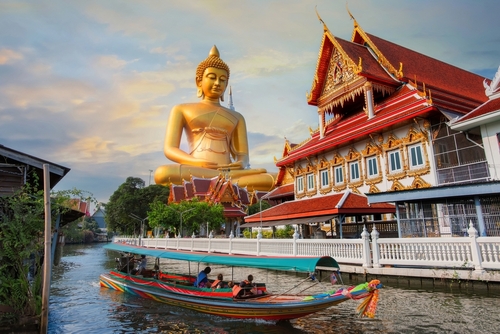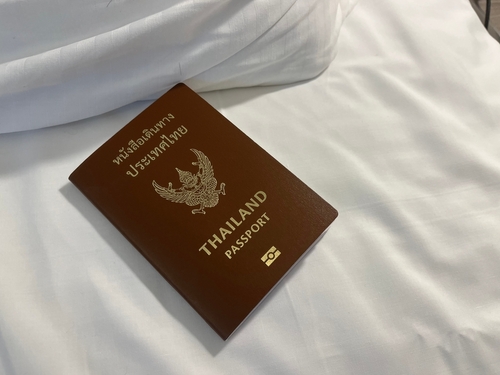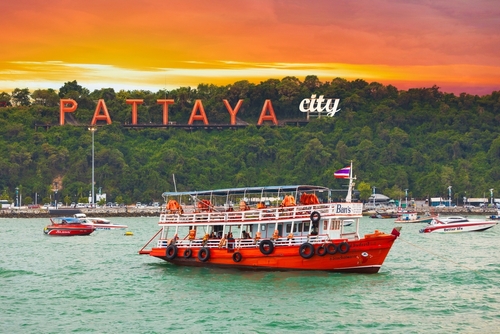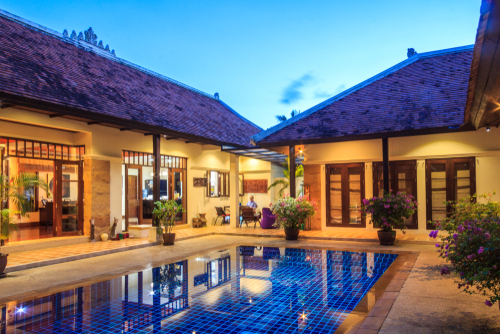For decades, Thailand has been an extremely popular tourist destination—but it is also an excellent place for expats to live. Thousands of Americans and other nationalities have made the move to this country to enjoy its affordable cost of living, good healthcare systems, and tourist attractions.
If you’re thinking of moving to Thailand in 2025, this Remitly guide will provide you with the information you need to know. From understanding visa types to choosing the best neighborhoods for expats, you’ll find out what to do to make your move smooth and comfortable.
Why move to Thailand?
The first question on your mind is probably why you should move to Thailand, so here are a few reasons to think about.
Cost of living: The prices of items and services can vary from one region to another, but generally, expect to spend below $2000 USD per month. Of course, expenses may be higher if you have a family or dependents. In very general terms, the cost of living is about 2.7 times lower than in the US.
Friendly locals: Thai people are among the friendliest in the world. Their smiles and warm, welcoming nature will make you feel right at home. Thais try to live with a jai yen, which translates to a cool heart, so they are generally level-headed and calm in temperament. The culture also holds elders in high esteem and values the community spirit.
Thriving economy: The country’s robust economy means there is a significant need for skilled labor and entrepreneurs. Lower prices and strong growth make it a good environment for investing, too. If you’re a first-time investor, you can always learn the ropes fast and hit the ground running.
Infrastructure and nature: The country’s infrastructure is comparatively well-developed, making it an easy place to live. You’ll enjoy convenient transport options, including public buses, trains, bicycles, and boats. Modern buildings, shopping malls, and high-end restaurants are also available in bigger cities.
The country boasts some of the best beaches and nature reserves, which is a plus if you’re an outdoors person. The temples are breathtaking, and the bustling markets and exciting cultural events will fascinate you every time you visit.

Understanding Thai Visas
Before moving to Thailand, you’ll likely need to apply for a visa. There are several options to consider, depending on your circumstances and reason for moving.
Tourist visa
If you’re planning a short stay for tourism purposes, US citizens are entitled to a 60-day visa exemption. In addition, you can get a 30-day extension at a fee. If you wish to stay for over 90 days, you’ll need to obtain a valid Thai visa from an embassy or consulate.
Education visa
The Education visa is issued to foreigners who wish to study, attend a seminar, training, or internship in the country. It is valid for 90 days but can be renewed for up to a year.
Work visa
If you’re planning on working in Thailand, you must obtain a work visa and permit. Your organization, government, or employer is usually responsible for applying for a work permit and visa on your behalf.
Retirement visa
Retirement visas are available for applicants above the age of 50. The visa is valid for a year, and employment is prohibited. You’ll need to provide proof of pension or income from a source outside Thailand.
Permanent visa
The permanent residence visa or permit allows you to stay in the country permanently. It’s usually offered to 100 people from each eligible nationality. To qualify, you must have resided in the country legally for at least 3 years.
Thailand Digital Nomad visa
The digital nomad visa grants you a 5-year multiple-entry visa to stay in the Kingdom. Each entry allows you to live and work within the country’s borders for up to 180 days. What’s more, you have the option to apply for a 180-day extension. That’s just 5 days shy of a year. It’s an ideal pick if you’re a digital nomad or remote worker.

How to apply for a Thai visa
Applying for a Thai visa can be a breeze if you’re prepared and meet all the requirements. Here is how to make the process smooth and painless.
Step 1: Gather required documents
Make sure you have all the necessary paperwork in order. Depending on the type of visa you’re applying for, some of the things you may need include:
- A passport valid for six months with a minimum of two blank pages
- A completed visa application form
- A recent passport-size photo
- Proof of financial stability
- proof of employment or business ownership
- Proof of residence documents, such as a utility bill or lease agreement
- Health insurance coverage
Step 2: Submit the application
You can submit the application online via the Thai e-Visa platform, or in person at a Thai embassy or consulate in your home country. It’s prudent to double-check specific requirements, as some embassies or consulates may have additional steps.
Step 3: Attend an interview
Some applicants may have to attend a physical or online interview. There are also instances when biometrics may need to be taken.
Step 4: Await approval
Once you complete the steps above, you may have to wait for a few days or weeks before you receive your visa approval.
Best places to live in Thailand
The ideal place to live depends on your lifestyle and family situation. Your budget and hobbies should also play a role in your decision-making process. Here are a few recommendations to keep in mind.
Best places for retirees to live
Hua Hin: This town’s closeness to Bangkok ensures you’ve access to all the amenities you may need. On the flipside, it’s quite calm and relaxed without the hustle and bustle of a big city. It also features good healthcare facilities.
Phuket: This town has warm weather and friendly people. Like Hua Hin, it has exceptional healthcare facilities, fresh produce, nice restaurants, and good weather.
Best places for families
Chiang Mai: If you have a family or plan on building one, Chiang Mai may be a good pick. It offers a blend of traditional and modern vibes, with locals holding on to family values. You’ll be spoilt for choice when it comes to outdoor activities and places to visit. There’s something for just about every age group.
Bangkok: Head over to Bangkok if you want to enjoy things like world class hotels and restaurants, modern healthcare facilities, and schools. The city boasts excellent infrastructure and offers lots of indoor and outdoor activities for the whole family.
Best places for singles and digital nomads
On Nut: Bangkok’s On Nut is a great choice for singles who are seeking fun and adventure. It has plenty of decent eateries, and the food is not only delicious but affordable, too. You’ll find a vibrant nightlife and a lot of outdoor activities to enjoy.
Pattaya: This is a vibrant city with a lot of foreigners. Like other parts of the country, it offers a diverse landscape with a blend of nature and human development. You’ll love the nightlife and probably get a chance to meet lots of people from around the world.

Finding housing in Thailand
Once you decide on the ideal location, you’ll need to start scouting for the best accommodations. Luckily, there are plenty of options to choose from.
Airbnb and hotels
If you’re a digital nomad or an individual who enjoys moving from one place to another, Airbnb can be a good option. Search for the best ones available through the local website. Consider the different price points and settle on the most suitable for your lifestyle.
Hotels are available too but may be slightly costlier in comparison to Airbnbs. But of course, you get to enjoy staff service and amenities that may be lacking at local stays. In most cases, you can book your stays online, which is quite convenient.
Long-term rentals
You can also opt for long-term accommodation in rental houses. To get a decent house, you may need to use the services of a local real estate agent, as they tend to have more information about their region.
Local and international real estate sites like Realtor.com may also be useful, so don’t hesitate to check them out.
Once you find a suitable house, talk to the landlord or property manager. Keep in mind that rent prices are typically negotiable. Be sure to read through the lease agreement carefully before signing.

Banking and money transfers
How you handle your banking and money transfers can make or break your experience of moving to Thailand in 2025. The good news is that it doesn’t have to be difficult. Firstly, set up a Thai bank account to make things easier. That way, you can deposit or withdraw Thai baht and make card purchases conveniently, without incurring too many charges.
Steps for setting up an account
Step 1: Choose a bank
Start by considering the different banks available. Some excellent examples include Kasikom Bank, Krung Thai Bank, TMBThanachart Bank, and Siam Commercial Bank.
They offer reliable financial services at affordable rates and have sophisticated security measures to keep your data and money safe.
Step 2: Submit an application
Most banks allow individuals to open accounts online or in person. You’ll need documents such as your passport, visa, and proof of residence when submitting your application.
Step 3: Get a bank account
Once the bank reviews your details, it will approve the application and give you an account number so you can start transacting.
Sending and receiving money
Apart from having a bank account, you may also need to find a reliable money transfer service. This will make it easy for you to send or receive money from different parts of the world. Money transfer service providers like Remitly are not only safe but also fast and affordable. These service providers facilitate the transfer and conversion of US or Canadian dollars to Thai baht at competitive exchange rates.

Healthcare and safety
Thailand has an impressive healthcare system with a mix of public and private facilities. To get the most out of it, consider getting medical insurance before moving to Thailand.
A good insurance plan can cost anything from $1100 USD to $100,000 USD per year. The costs vary depending on your residency or visa status and the services you enroll in. In most cases, your cover will ensure you get the best treatment from top-notch facilities.
Transportation and moving around
When it comes to transportation, rest assured that you’ll find something to suit your needs.
While moving within cities, you can use buses, Skytrain, and water taxis.
If you are planning on traveling to other regions, you can always take trains and domestic flights. Additionally, long-distance buses are relatively cheap if you are willing to spend a few hours on the road.
What’s stopping you from moving to Thailand?
Not only do you get to enjoy an affordable cost of living in Thailand, but you’re also in close proximity to some of the world’s best tourist attractions and destinations.
FAQs
Why are so many Americans moving to Thailand?
A lot of Americans move to Thailand because of the affordable cost of living. Other reasons include a vibrant culture, social experiences, good healthcare, modern infrastructure, and tourism.
Is moving to Thailand safe for expats?
Thailand is a relatively safe and welcoming country to expats. However, it’s always a good idea to stay informed about potential risks, including areas prone to criminal activity. Avoid putting yourself in risky situations, such as walking alone at night in secluded areas.
What is the best place to move to in Thailand as an expatriate?
Some of the best places for expatriates to move to in Thailand include Bangkok, Pattaya, Hua Hin, Phuket, and Chiang Mai.
